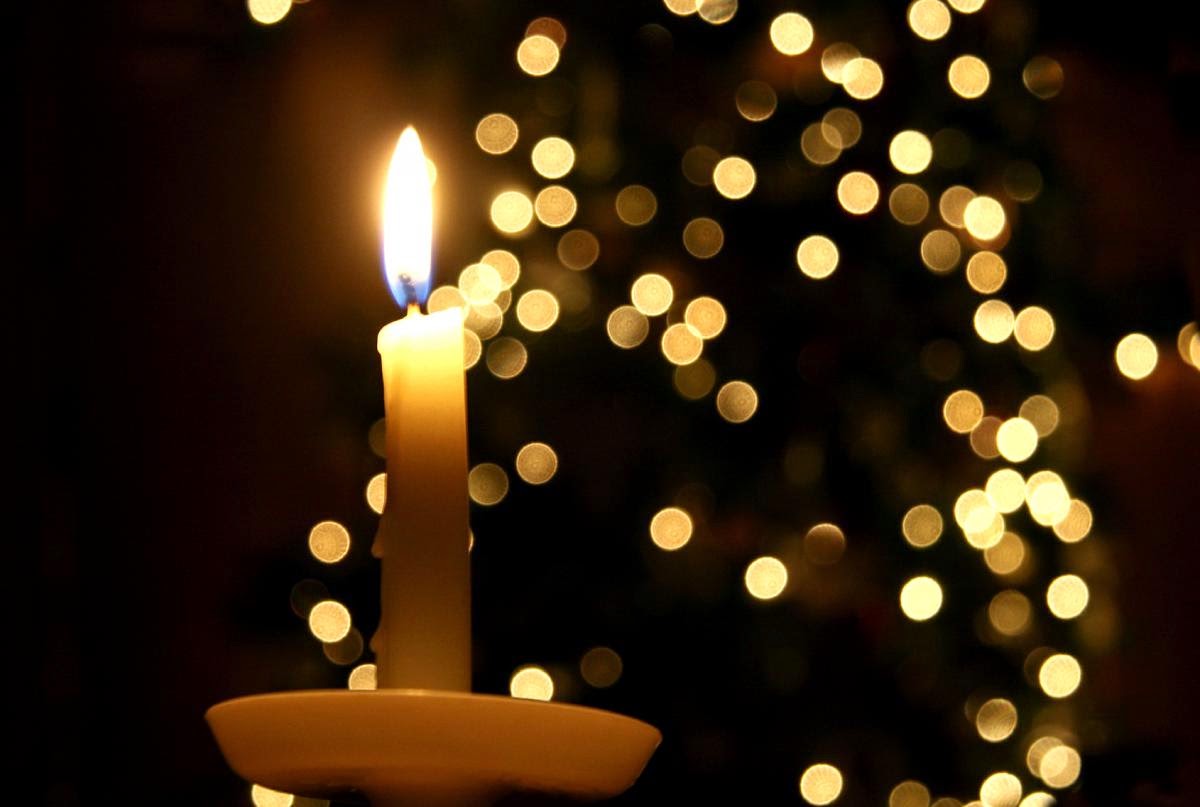and solitude of my daughter's farm. I am doing likewise today and, God willing, will do so again next New Year's Eve. We walked in the cold and frozen woods yesterday after feeding goats and chickens and tending to the dogs. Right now the household is silent and I am reminded of something I heard on Krista Tippet's "On Being." Gordon Hampton observed that "silence is an endangered species" in our culture. Then he notes that real quiet is not so much a sound as a presence: "in fact, it is not an absence of sound, but the absence of noise."
That was exactly my experience yesterday in the woods. And as we walked in the healing, cold silence I began thinking of this year past - its highs and lows, its major themes and challenges - which led me to make a list. It is not complete, of course, and maybe isn't even truthful. Still, it is what bubbled to the surface during my time in the quiet. (I also took a brief trip through last year's blog posts to see how my list compared to my written observations and there is a certain continuing resonance.) So here is what I discovered were major considerations for me in 2014:
Grief, grace and the paradox of proximity
Dealing with the death of dear friends
Ending one musical commitment and finding others
Honoring the blessings of being a grandfather
Relentlessly searching for solitude and silence as nourishment for ministry
Enjoying both Mr. E and Carrie Newcomer in Boston
The artistry of Joni Mitchell
Rethinking my early jazz influences
Sabbatical: preparation and hopes
Race hatred/white privilege
Israel/Palestine
Sabbath
Inward/outward journey
Lucie
My father’s illness and death
Loss as spiritual discipline
From within the warmth of this old farm house this morning, I can see that it has been a full year - with much more grief in it than I realized. In that way 2014, like 2013, took its toll on my soul. At the same time, I sense that my grief and loss served as "soul food" for me on the road towards gravitas as M. Craig Barnes discussed in The Pastor as Minor Poet. For as I lived into this sorrow myself (and clearly am still doing so just a few months after my father's passing) and journeyed with family and church members into their own sorrow, I have discovered an unexpected sad beauty within our tears. It is a tender privilege to share the solace of trusting our anguish from within the safety and softness of grace. This year I have been blessed by it with Dianne, sensed it with Peter and have honored it with a few others whether we were in Tucson or Pittsfield or Maryland.
Looking backwards I see how this sojourn into grief also deepened my music making. I didn't play very many popular gigs this year; in cooperation with close musical colleagues, however, we did create some stunning art at Good Friday and Christmas Eve that had beauty and pathos. There was also a kick-out the jams rock and roll party this summer that was too much fun as it raised funds for our local eco-justice mission partner and brought together some of my favorite local rock and folk players. Whether it was the racial reconciliation between my congregation and our sister church born of bigotry 160 years ago, and addressed at our 250 anniversary; the ripples of fear and mistrust that still reverberate everywhere in the USA after Ferguson; or the relentless agony we all know as two very different peoples struggle to find a way into peace on one land in Israel and Palestine, there has been a very public aspect to my ministry this year in addition to my regular inward journey pissing and moaning.
One more insight strikes me as I look backwards through 2014: how much Dianne has loved and strengthened me. Her quiet wisdom and no-nonsense presence has been a rock. Our lives are inextricably woven together in music, art, poetry, photography, worship, caring for Lucie, doing ministry, loving our children and friends and being present for one another in ordinary ways. This year's Christmas present was illustrative: a two day quiet retreat with lots of time set aside for quiet walking, browsing book stores and conversation. I am so very grateful.
This poem by Wendell Berry, whom my daughter Michal turned me on to years ago, seems like the right way to close out my last posting for 2014 from her farm. In his collection of Sabbath reflections, A Timbered Choir, he writes:
Another Sunday morning comes
And I resume the standing Sabbath
Of the woods, where the finest blooms
Of time return, and where no path
Is worn but wears its makers out
At last, and disappears in leaves
Of fallen seasons. The tracked rut
Fills and levels; here nothing grieves
In the risen season. Past life
Lives in the living. Resurrection
Is in the way each male leaf
Commemorates its kind, by connection
Outreaching understanding. What rises
Rises into comprehension
And beyond. Even falling raises
In praise of lihht. What is begun
That comes to rest among the bluebells
Comes to rest in motion, refined
By alteration. The bud swells,
Opens, makes seed, falls, is well,
Being becoming what it is:
Miracle and parable
Exceeding thought, because it it
Immeasurable; the understander
Encloses understanding, thus
Darkens the light. We can stand under
No ray that is not dimmed by us.
The mind that comes to rest is tended
In ways that it cannot intend.
Is borne, preserved, and comprehended
By wha it cannot comprehend.
Your Sabbath, Lord, thus keeps us by
Your will, not ours. And it is fit
Our only choice should be to die
Into that rest, or out of it.
Happy New Year - and many blessings of peace to come!
credits: Dianne De Mott









.jpg)



















